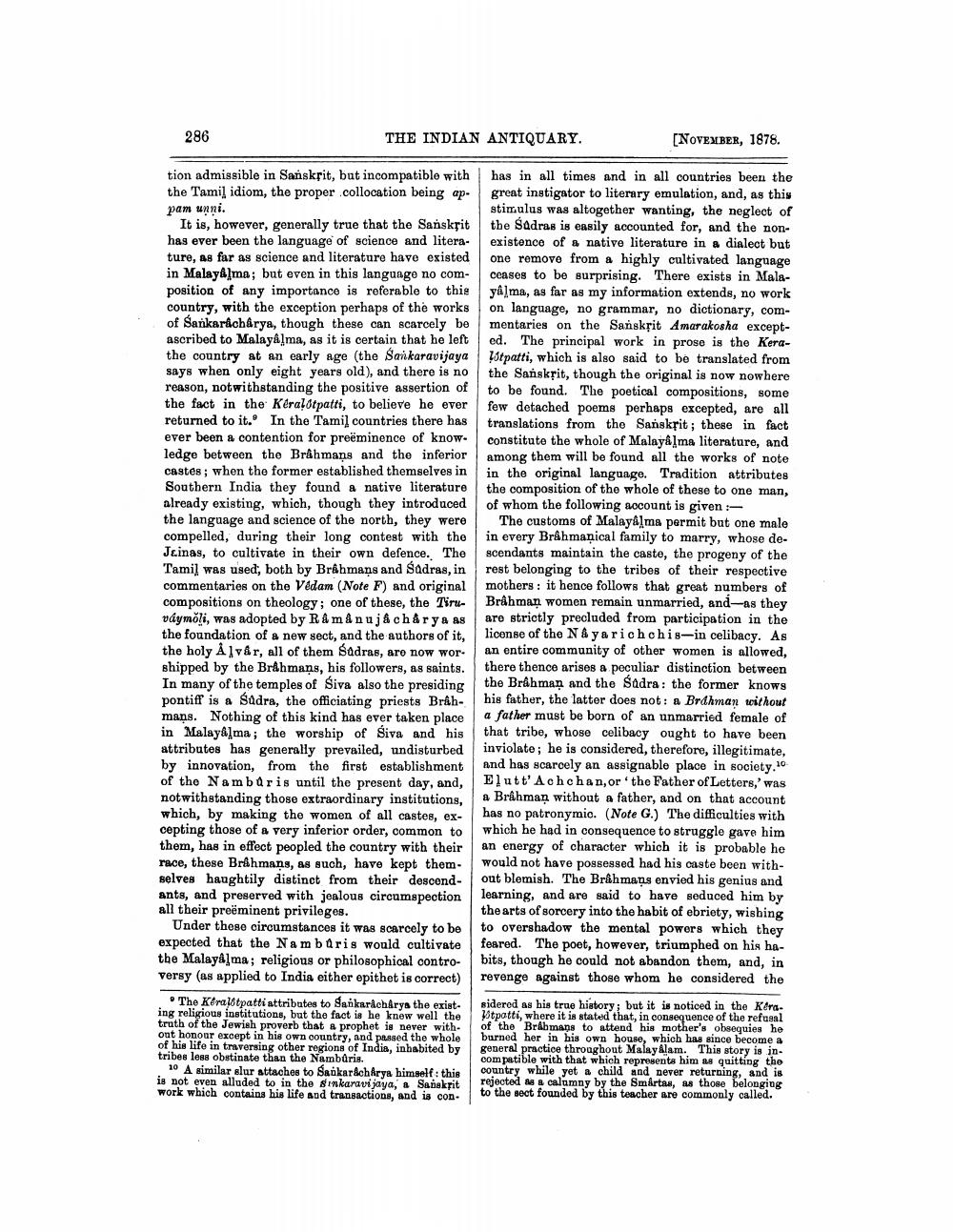________________
286
THE INDIAN ANTIQUARY.
tion admissible in Sanskrit, but incompatible with the Tamil idiom, the proper collocation being appam unni.
It is, however, generally true that the Sanskrit has ever been the language of science and literature, as far as science and literature have existed in Malayalma; but even in this language no composition of any importance is referable to this country, with the exception perhaps of the works of Sankaracharya, though these can scarcely be ascribed to Malayalma, as it is certain that he left the country at an early age (the Sankaravijaya says when only eight years old), and there is no reason, notwithstanding the positive assertion of the fact in the Kéralôtpatti, to believe he ever returned to it. In the Tamil countries there has ever been a contention for preeminence of knowledge between the Brahmans and the inferior castes; when the former established themselves in Southern India they found a native literature already existing, which, though they introduced the language and science of the north, they were compelled, during their long contest with the Jainas, to cultivate in their own defence. The Tamil was used; both by Brahmans and Sadras, in commentaries on the Védam (Note F) and original compositions on theology; one of these, the Tiruváymoli, was adopted by R & m & nujâcharya as the foundation of a new sect, and the authors of it, the holy Alvar, all of them Sadras, are now wor shipped by the Brahmans, his followers, as saints. In many of the temples of Siva also the presiding pontiff is a Sûdra, the officiating priests Brâhmans. Nothing of this kind has ever taken place in Malayalma; the worship of Siva and his attributes has generally prevailed, undisturbed by innovation, from the first establishment of the Nambaris until the present day, and, notwithstanding those extraordinary institutions, which, by making the women of all castes, excepting those of a very inferior order, common to them, has in effect peopled the country with their race, these Brahmans, as such, have kept themselves haughtily distinct from their descendants, and preserved with jealous circumspection all their preeminent privileges.
Under these circumstances it was scarcely to be expected that the Nambaris would cultivate the Malayalma; religious or philosophical controversy (as applied to India either epithet is correct)
The Kérastpatti attributes to Sankaracharya the exist ing religious institutions, but the fact is he knew well the truth of the Jewish proverb that a prophet is never with out honour except in his own country, and passed the whole of his life in traversing other regions of India, inhabited by tribes less obstinate than the Nambûris.
10 A similar slur attaches to Sankaracharya himself: this is not even alluded to in the sinkaravijaya, a Sanskrit work which contains his life and transactions, and is con
[NOVEMBER, 1878.
has in all times and in all countries been the great instigator to literary emulation, and, as this stimulus was altogether wanting, the neglect of the Sadras is easily accounted for, and the nonexistence of a native literature in a dialect but one remove from a highly cultivated language ceases to be surprising. There exists in Malayâlma, as far as my information extends, no work on language, no grammar, no dictionary, commentaries on the Sanskrit Amarakosha excepted. The principal work in prose is the Kerastpatti, which is also said to be translated from the Sanskrit, though the original is now nowhere to be found. The poetical compositions, some few detached poems perhaps excepted, are all translations from the Sanskrit; these in fact constitute the whole of Malayalma literature, and among them will be found all the works of note in the original language. Tradition attributes the composition of the whole of these to one man, of whom the following account is given :
The customs of Malayalma permit but one male in every Brahmanical family to marry, whose descendants maintain the caste, the progeny of the rest belonging to the tribes of their respective mothers: it hence follows that great numbers of Brahman women remain unmarried, and-as they are strictly precluded from participation in the license of the N&yarichchis-in celibacy. As an entire community of other women is allowed, there thence arises a peculiar distinction between the Brahman and the Sadra: the former knows his father, the latter does not: a Brahman without a father must be born of an unmarried female of that tribe, whose celibacy ought to have been inviolate; he is considered, therefore, illegitimate, and has scarcely an assignable place in society, 10Elutt' Achchan, or the Father of Letters,' was a Brahman without a father, and on that account has no patronymic. (Note G.) The difficulties with which he had in consequence to struggle gave him an energy of character which it is probable he would not have possessed had his caste been without blemish. The Brahmans envied his genius and learning, and are said to have seduced him by the arts of sorcery into the habit of ebriety, wishing to overshadow the mental powers which they feared. The poet, however, triumphed on his habits, though he could not abandon them, and, in revenge against those whom he considered the
sidered as his true history; but it is noticed in the Kératpatti, where it is stated that, in consequence of the refusal of the Brahmans to attend his mother's obsequies he burned her in his own house, which has since become a general practice throughout Malayalam. This story is incompatible with that which represents him as quitting the country while yet a child and never returning, and is rejected as a calumny by the Smårtas, as those belonging to the sect founded by this teacher are commonly called.




